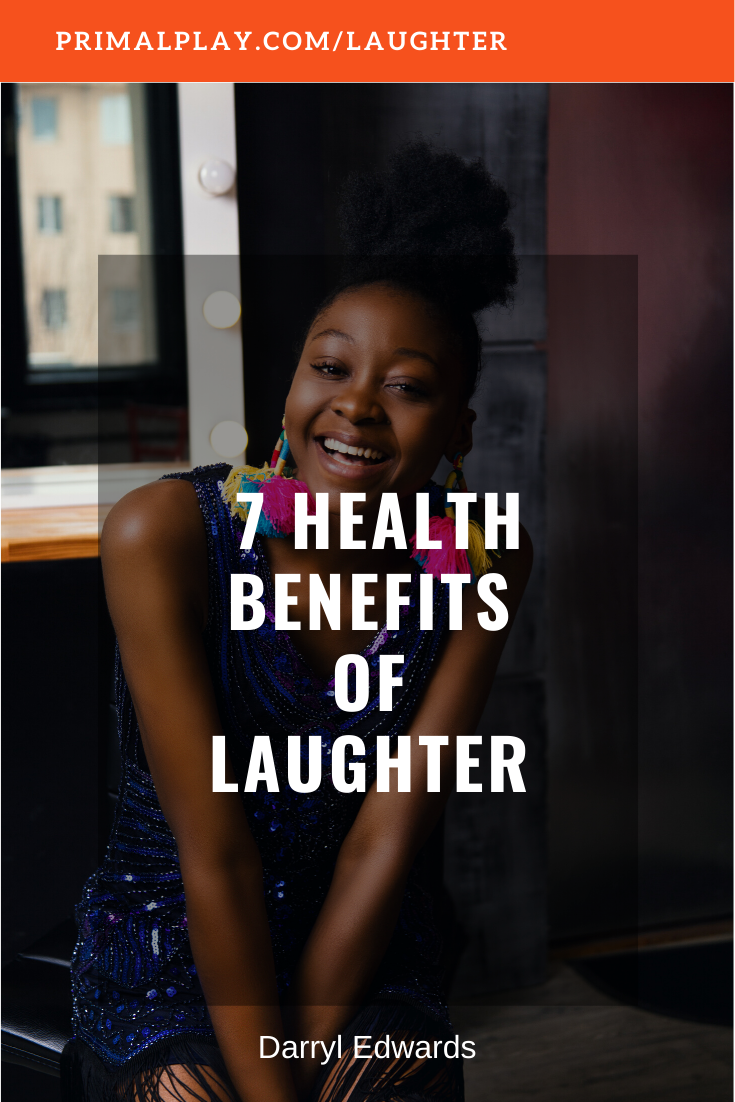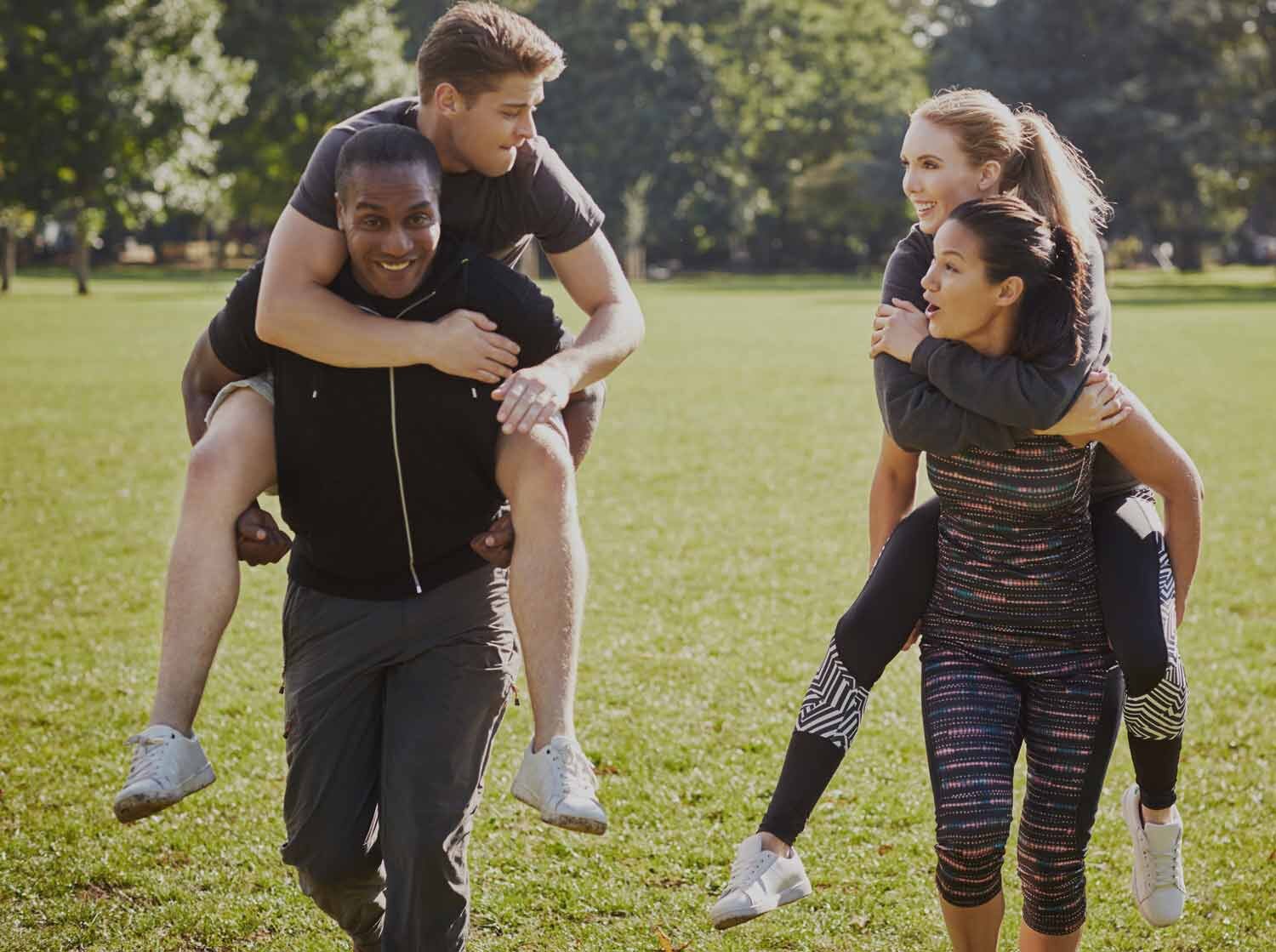The Top 7 Health Benefits of Laughter
““I love people who make me laugh. I honestly think it’s the thing I like most, to laugh. It cures a multitude of ills.
It’s probably the most important thing in a person.””
7 Incredible Health Benefits of Laughter
When did you last laugh during exercise?
You probably are finding it difficult to remember because it’s not something that happens often with exercise, no place for smiles when a grimace is expected for all the hard work you have put into your workout.
Think of the pleasure you had playing out as a kid and how often laughter would be a part of that memory, then think of your last gym session…
One of the things you may have noticed after watching my TED talk "Why working out isn't working out" is the laughter that occurs with engaging and playful movement. Not just for kids but for adults too.
Laughter is a key part of the Primal Play Method, not just because it makes movement more fun but also because it has some scientifically proven health benefits. Laughter lowers blood pressure, reduces stress, improves the immune system, increases energy and motivation and just makes you feel good.
In some respects laughter can be just as beneficial for you as exercise. It's also why it is an intended outcome of many Primal Play Method games that I’ve developed such as Primal Play Tag.
Laughter + Exercise = GREATER HEALTH.
Here are seven key benefits of laughter for health.
#1. LAUGHTER IS GREAT FOR THE HEART
Just like exercise, laughter can increase blood flow to the heart and improve vascular health, great for both heart rate and blood pressure control. Humour is good for the heart. Laughter is linked to the healthy function of blood vessels and dramatically helps with cardiovascular health.
Laughter causes the inner lining of blood vessels (the endothelium) to expand to increase blood flow, while stress has the reverse effect, constricting blood vessels and reducing blood flow. Regular laughter can help protect you against a heart attack and other cardiovascular problems. [1] [2]
Other studies show that laughter can increase heart rate variability (HRV), attenuated (reduced) HRV is a risk factor for long term adverse health outcomes. [13]
#2. LAUGHTER IS A GREAT MOOD REGULATOR
Endorphins and serotonin are neurotransmitters that are often referred to as "feel-good hormones" that elicit feelings of bliss and improve your mood. [5]
Studies have found that laughter in groups triggers the release of endorphins in brain regions responsible for arousal and emotion. Social laughter supports the formation, reinforcement, and maintenance of social bonds between humans. [3]
Laughter triggers the production of dopamine, which produce calming, benefits as well as providing us pleasure and reward.
RELATED: Play and The Feel Good Hormones
#3. LAUGHTER IS A NATURAL FORM OF PAIN RELIEF
There are different types of endorphins in humans. As well as pleasure, endorphins can perform the role of pain relief too. In the book Anatomy of an Illness, the author Cousins described laughter as creating an analgesic effect for pain caused by his long-term condition of arthritis of the spine (ankylosing spondylitis). Cousins found that 10 minutes of laughter enabled him two hours of pain-free sleep. [7] The endorphins released when we laugh block pain transmitters from signalling to the brain. We feel less pain and fewer adverse effects of stress as a result. [4]
#4. LAUGHTER REDUCES STRESS
Stress reduction has been shown to improve outcomes in the treatment of many health problems. The stress hormone, cortisol, plays a role not only in depression, anxiety, and stress but also chronic pain. Laughter reduces cortisol production in studies on spontaneous laughter which examined the stress hormones levels before and after laughter. [6] This positive impact can exist even when laughter is forced. [9] Another study suggests that the immediate psychological benefits of humour are comparable to the mental benefits of a bout of aerobic exercise. [10]
A study looking at the acute benefits of 20-minutes of humour compared to 20-minutes of exercise found that they both had an equally positive effect on psychological distress and positive wellbeing. However, humour exerted more significant anxiety-lowering influence than exercise. [11]
Laughter with Piggy-Back Carries!
#5. LAUGHTER WORKS THE CORE
Laughter is excellent for improving lung capacity, which makes your respiratory system all the more efficient. It works the trunk muscles, stomach, back and intercostals (muscles surrounding the ribs) and other muscles around the body such as neck and face. In one study which compared laughter to crunch and back lifting exercises, in terms of core muscle engagement, the activation level of internal oblique muscles was higher than conventional exercises and matched the activities for the activation of the external oblique muscles. [14]
If you laugh hard for lengthy periods, you can even feel an ache in your stomach due to the rapid movement of the diaphragm which is below the lungs and just above the stomach. It forces out the air that is in the bottom of the lungs, which is why laughter is such an excellent aerobic exercise.
Though it might not be much, laughter can burn as much as ten to forty calories in 10-15 minutes, as it raises energy expenditure and increases heart rate 10 per cent to 20 per cent, according to research conducted by Vanderbilt University Medical Center.
#6. LAUGHTER IS GOOD FOR THE IMMUNE SYSTEM
Studies suggest better functioning immune system activity after laughter [17]. People who laugh more often also have higher numbers of T-cells, or white blood cells, in their blood, which is excellent for the immune system and fending off diseases.
What is even more interesting is that NK (natural killers) lymphocyte cells are produced in greater quantity reducing the risk of infection.
An increase in NK cells are linked to increased disease resistance and decreased morbidity in persons with cancer [18] [19].
#7. LAUGHTER IS GREAT FOR LONGEVITY
People who laugh a lot more often also tend to have a better outlook. Those with positive attitudes tend to live longer and fight off diseases more effectively. In a 2012 study published in the journal Aging, researchers from Yeshiva University in the US identified several factors centenarians (100-year-olds) had in common. A love of laughter was one. They considered laughter an essential part of living a longer life. [8]
Laughter is as vital to our health as we grow up. For that reason, physical activities that get those smile lines showing are much more useful than others that don't.
Laughter strengthens your immune system, helps to bond with others, boosts mood, diminishes pain, and protects you from the damaging effects of stress.
Active play does this too - combining both physical activity and laughter is even more powerful and enhances the health benefits. Laughter helps to keep us well. [12] One of the most compelling reasons to choose to play out with Primal Play instead of just working out!
““Laughter lowers blood pressure, reduces stress, improves the immune system, increases energy and motivation and just makes you feel good.””
RELATED POSTS:
REFERENCES:
[1] Miller, M. and Fry, W.F. (2009). "The effect of mirthful laughter on the human cardiovascular system.", Medical Hypotheses, 73(5), pp.636–639.
[2] "School of Medicine Study Shows Laughter Helps Blood Vessels Function Better." 2013. University of Maryland Medical Center. 2013. http://web.archive.org/web/20140221003548/http://umm.edu/news-and-events/news-releases/2005/school-of-medicine-study-shows-laughter-helps-blood-vessels-function-better.
[3] Manninen, Sandra, Lauri Tuominen, Robin I. Dunbar, Tomi Karjalainen, Jussi Hirvonen, Eveliina Arponen, Riitta Hari, Iiro P. Jääskeläinen, Mikko Sams, and Lauri Nummenmaa. 2017. "Social Laughter Triggers Endogenous Opioid Release in Humans." The Journal of Neuroscience 37 (25): 6125–31. https://doi.org/10.1523/jneurosci.0688-16.2017.
[4] Dunbar RI, Baron R, Frangou A, Pearce E, van Leeuwen EJ, Stow J, Partridge G, MacDonald I, Barra V, van Vugt M (March 2012). "Social laughter is correlated with an elevated pain threshold". Proceedings. Biological Sciences. 279 (1731): 1161–7. doi:10.1098/rspb.2011.1373. PMC 3267132. PMID 21920973.
[5] Dfarhud D, Malmir M, Khanahmadi M (November 2014). "Happiness & Health: The Biological Factors- Systematic Review Article". Iranian Journal of Public Health. 43 (11): 1468–77. PMC 4449495. PMID 26060713.
[6] Berk, Lee S., Stanley A. Tan, William F. Fry, Barbara J. Napier, Jerry W. Lee, Richard W. Hubbard, John E. Lewis, and William C. Eby. 1989. "Neuroendocrine and Stress Hormone Changes During Mirthful Laughter." The American Journal of the Medical Sciences 298 (6): 390–96. https://doi.org/10.1097/00000441-198912000-00006.
[7] Cousins, N. and René Dubos (2005). "Anatomy of an illness as perceived by the patient : reflections on healing and regeneration". New York: Norton.
[8] Kato, K., Zweig, R., Barzilai, N. and Atzmon, G. (2012). "Positive attitude towards life and emotional expression as personality phenotypes for centenarians." Aging, 4(5), pp.359–367.
[9] Foley, Erin, Robert Matheis, and Charles Schaefer. 2002. "Effect of Forced Laughter on Mood." Psychological Reports 90 (1): 184–184. https://doi.org/10.2466/pr0.2002.90.1.184.
[10] Szabo, Attila, Sarah E. Ainsworth, and Philippa K. Danks. 2005. "Experimental Comparison of the Psychological Benefits of Aerobic Exercise, Humor, and Music." Humor 18 (3). https://doi.org/10.1515/humr.2005.18.3.235.
[11] Attila Szabo (2003) "The Acute Effects of Humor and Exercise on Mood and Anxiety", Journal of Leisure Research, 35:2, 152-162, DOI: 10.1080/00222216.2003.11949988
[12] Hassed, C, "How humour keeps you well.", Aust Fam Physician. 2001 Jan;30(1):25-8.,
[13] Tay, Kimberly, and Ann Linda Baldwin. 2015. "Effects of Breathing Practice in Vinyasa Yoga on Heart Rate Variability in University Students- A Pilot Study." Journal of Yoga & Physical Therapy 05 (04). https://doi.org/10.4172/2157-7595.1000214.
[14] Wagner, H., Rehmes, U., Kohle, D. and Puta, C. (2014)., "Laughing: a demanding exercise for trunk muscles." Journal of motor behavior, [online] 46(1), pp.33–7. https://www.ncbi.nlm.nih.gov/pubmed/24246140
[15] "No Joke: Study Finds Laughing Can Burn Calories (06/10/05)." 2005. Vanderbilt.Edu. June 10, 2005. http://www.mc.vanderbilt.edu/reporter/index.html?ID=4030.
[16] Berk L, Tan S, Nehlsen-Cannarella S, Napier B, Lewis J, Lee J, et al. "Humor associated laughter decreases cortisol and increases spontaneous lymphocyte blastogenesis." Clin Res. 1988;36:435A.
[17] LEFCOURT, HERBERT M., KARINA DAVIDSON-KATZ, and KAREN KUENEMAN. 1990. “Humor and Immune-System Functioning.”, Humor - International Journal of Humor Research 3 (3). https://doi.org/10.1515/humr.1990.3.3.305.
[18] Bennett MP, Zeller JM, Rosenberg L, McCann J., "The effect of mirthful laughter on stress and natural killer cell activity.", Altern Ther Health Med. 2003 Mar-Apr;9(2):38-45.
[19] Takahashi, K., Iwase, M., Yamashita, K., Tatsumoto, Y., Ue, H., Kuratsune, H., Shimizu, A. and Takeda, M. (2001). "The elevation of natural killer cell activity induced by laughter in a crossover designed study.", International Journal of Molecular Medicine, Int J Mol Med. 2001 Dec;8(6):645-50.











